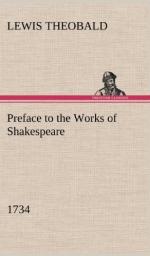It may be mention’d, tho’ no certain Conclusion can be drawn from it, as a probable Argument of his having read the Antients; that He perpetually expresses the Genius of Homer, and other great Poets of the Old World, in animating all the Parts of his Descriptions; and, by bold and breathing Metaphors and Images, giving the Properties of Life and Action to inanimate Things. He is a Copy too of those Greek Masters in the infinite use of compound and de-compound Epithets. I will not, indeed, aver, but that One with Shakespeare’s exquisite Genius and Observation might have traced these glaring Characteristics of Antiquity by reading Homer in Chapman’s Version.
[Sidenote: B. Jonson and Shakespeare compar’d.]
An additional Word or two naturally falls in here upon the Genius of our Author, as compared with that of Jonson his Contemporary. They are confessedly the greatest Writers our Nation could ever boast of in the Drama. The first, we say, owed all to his prodigious natural Genius; and the other a great deal to his Art and Learning. This, if attended to, will explain a very remarkable Appearance in their Writings. Besides those wonderful Masterpieces of Art and Genius, which each has given Us; They are the Authors of other Works very unworthy of them: But with this Difference; that in Jonson’s bad Pieces we don’t discover one single Trace of the Author of the Fox and Alchemist: but in the wild extravagant Notes of Shakespeare, you every now and then encounter Strains that recognize the divine Composer. This Difference may be thus accounted for. Jonson, as we said before, owing all his Excellence to his Art, by which he sometimes strain’d himself to an uncommon Pitch, when at other times he unbent and play’d with his Subject, having nothing then to support him, it is no wonder he wrote so far beneath himself. But Sbakespeare, indebted more largely to Nature, than the Other to acquired Talents, in his most negligent Hours could never so totally divest himself of his Genius, but that it would frequently break out with astonishing Force and Splendor.




